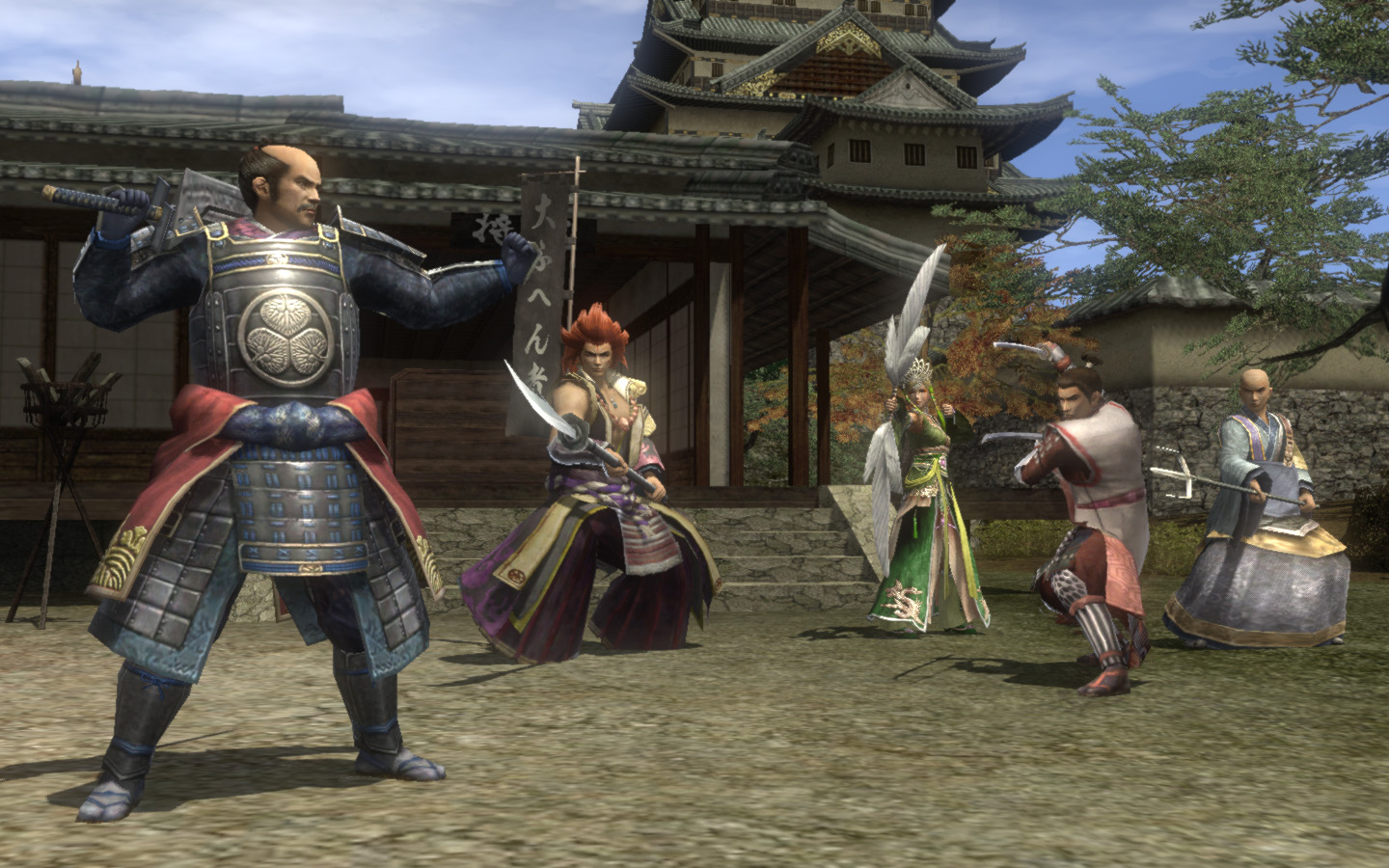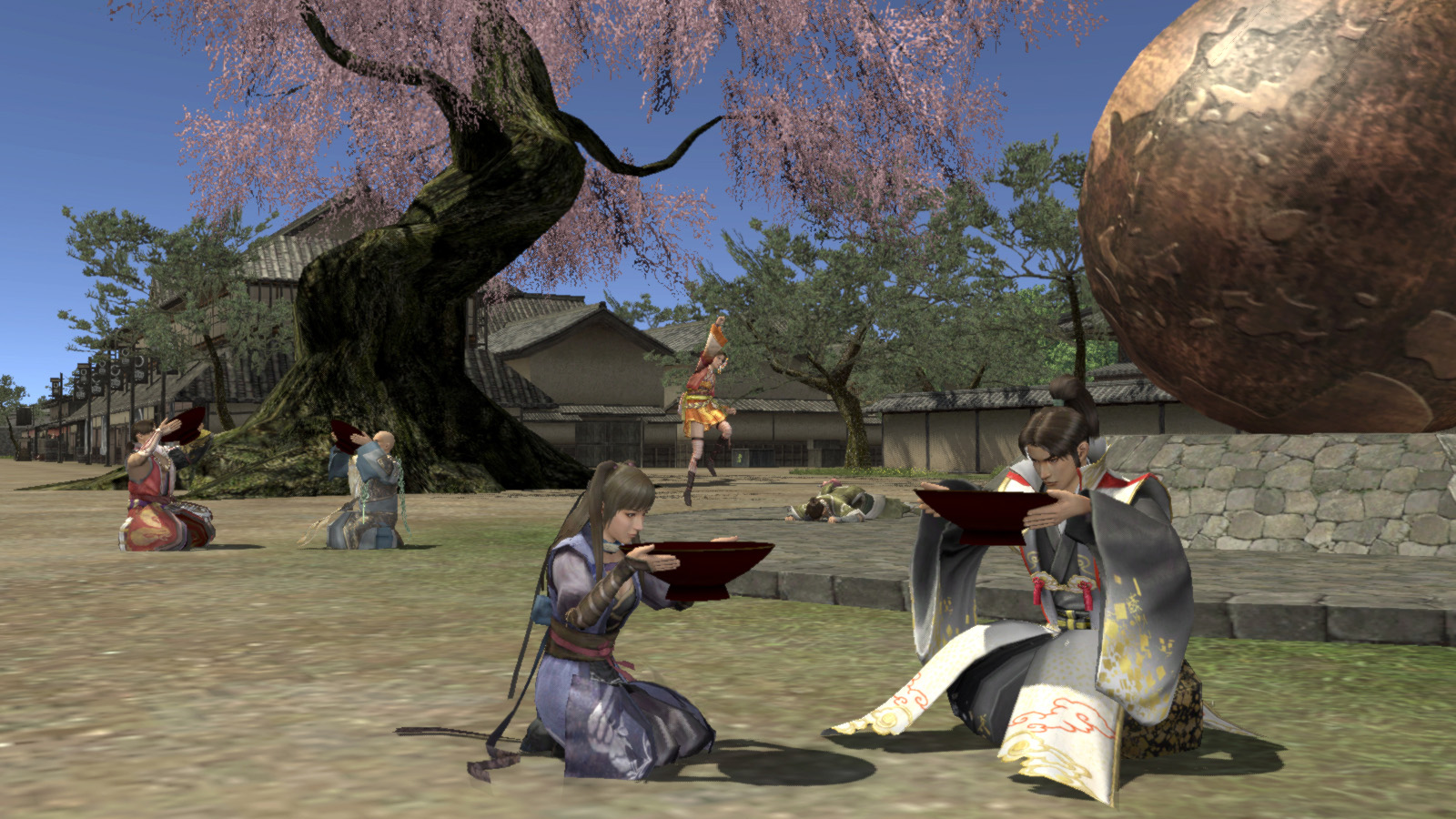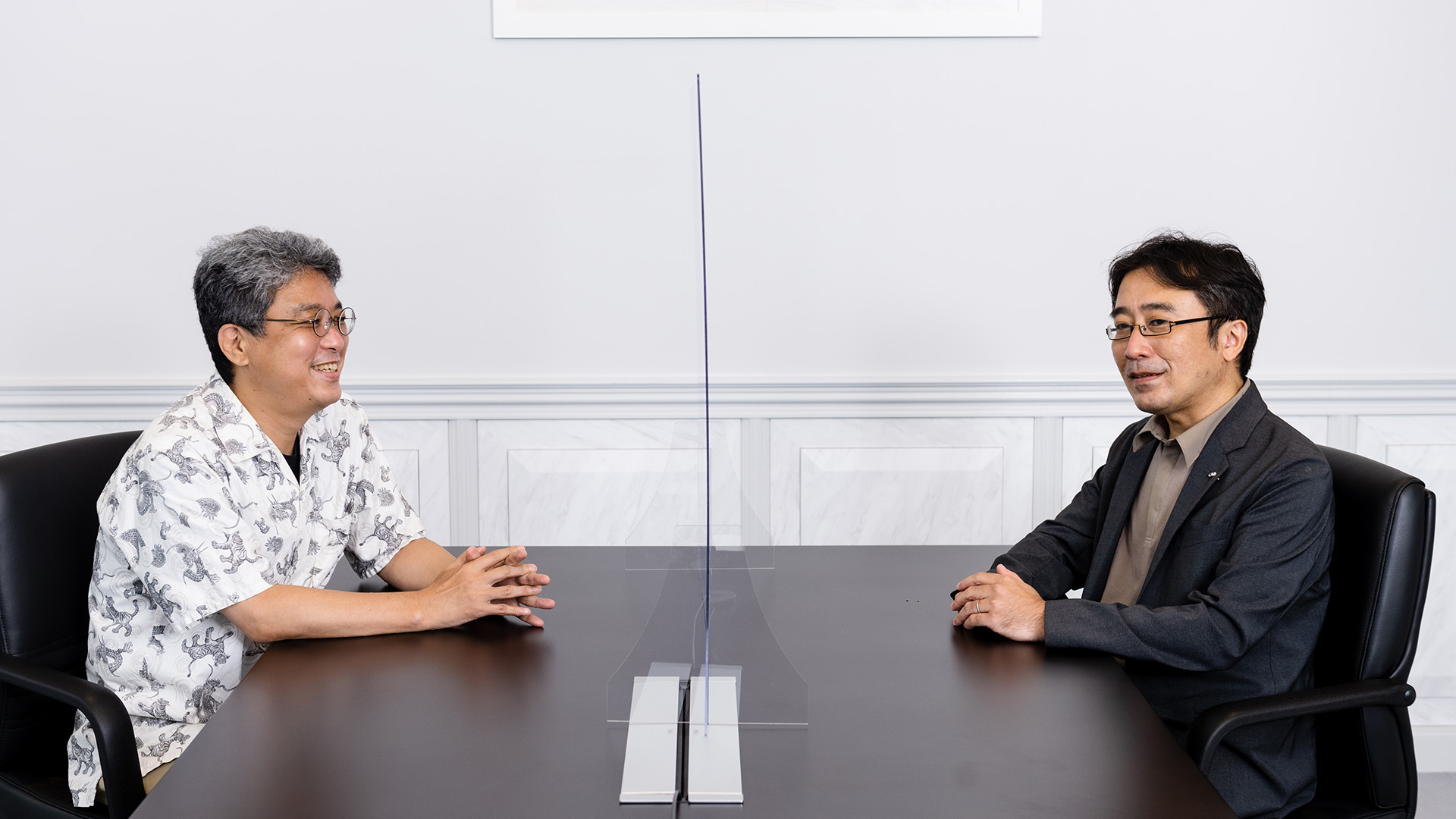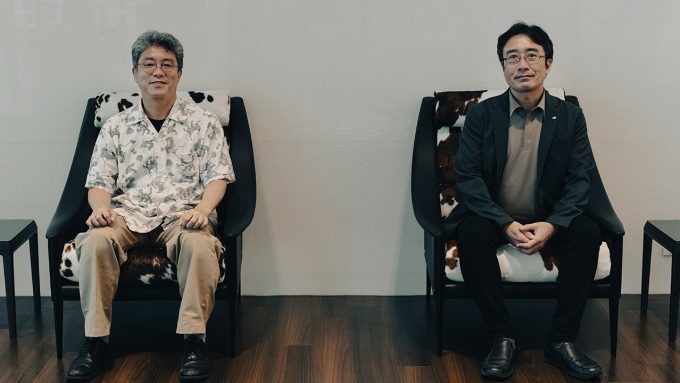For our third guest, we invited Yutaka Kawamata, the producer of NOBUNAGA’S AMBITION Online (NAO). In this fourth and final part, he shared the story behind NAO’s platform transitions and the unique enjoyment of communicating with others through MMORPGs.

Developer of NOBUNAGA’S AMBITION Online, an MMORPG based on the world of the NOBUNAGA’S AMBITION* series. In addition to his role as Director, he has assumed the position of Producer as of June 2019.
* NOBUNAGA’S AMBITION is a series of historical simulation games set in the Sengoku period of Japan, the first of which was released in March 1983. The series has continued to evolve since then, and the upcoming 16th title in the series, NOBUNAGA’S AMBITION: Shinsei, is scheduled to release this winter.
 NOBUNAGA’S AMBITION Online is an ongoing popular online RPG based around the premise of living in the world of the Sengoku period. Players may serve under prestigious clans such as Oda, Uesugi, Takeda, and Date, and fight their way through large-scale battles of up to a thousand players in the name of uniting the country under one rule.
NOBUNAGA’S AMBITION Online is an ongoing popular online RPG based around the premise of living in the world of the Sengoku period. Players may serve under prestigious clans such as Oda, Uesugi, Takeda, and Date, and fight their way through large-scale battles of up to a thousand players in the name of uniting the country under one rule.
NAO and FFXI on transitioning platforms
NAO originally launched on the PlayStation 2 (PS2) and later progressed to Windows, PS3, and PS4.
How did you make the decision to transition to each new platform?- Kawamata
I believe our big success on the PS2 influenced our later decisions to go multi-platform.
We were in service on the PS2 for a very long time, and though that was succeeded by the PS3 version, when the possibility of a PS4 version was considered, we decided the graphics needed to be overhauled to the latest standards and created both the PS4 and Windows HD versions. I’m sure there are those of us who would prefer to play games on a console, and I imagine they’ve stayed with us by upgrading their console for each new generation since the PS2. - Matsui
The PS4 version of NAO can be played on the PS5, and it’s truly incredible that the game has been available on four generations of consoles.
Keeping up with the latest graphics is a must when console platforms evolve in leaps and bounds.
However, considering the tremendous development cost of overhauling all the game’s resources up to that point, it must’ve been a huge commitment for the company.
Did you face any difficulties when asking for the company’s approval?- Kawamata
While it wasn’t exactly a smooth decision, I believe it was decided based on our track record and how it was necessary for the game to keep going.
In the case of FFXI, were there any debates regarding transitioning platforms?
- Matsui
For FFXI, it was already decided it would be succeeded by FINAL FANTASY XIV (FFXIV), so a PS3 version of FFXI was not considered.
Even if we’d decided to make a port of the game, overhauling the graphics and other aspects would result in a development cost similar to creating a completely new title. Either way, we would’ve preferred to make a proper PS3 version rather than a half-hearted effort, but at the time, that position was given to FFXIV.
So instead of trying to keep up with the latest trends and modern advancements, we passed on that role to FFXIV and adopted our current focus of staying in service as long as we can for players who are still enjoying FFXI. Back then, I’m sure even the development team never imagined FFXI would still be around for its 20th anniversary.
- Matsui
The other day, I was interviewed on the topic of how long-running projects have survived for so long. I explained that our initial goal was a minimum of three years, and we had hopes of keeping things going for maybe five years; staying in service for twenty years was not in our original vision.
Specifically, we planned to at least see Rise of the Zilart to the end, and hoped we’d still be around by the end of Chains of Promathia. But we just kept going and going, until we found ourselves approaching our 20th anniversary. A major component for our longevity is how we have the firm support of our company to keep going for our players, instead of them telling us, “The game’s not as profitable anymore, let’s shut it down.” I imagine similar things could be said for NAO as well. Did NAO begin with a goal for how long to remain in service?
- Kawamata
Back then, I wasn’t in a high-ranking position and was single-mindedly burning through development tasks, as if to say, “Bring it on! I can keep going forever!” But I’m sure our company had some expectations in place; after all, they’re a business and wouldn’t keep the game going if it wasn’t profitable.
Of course, separately from that, I’m sure they also wanted to maintain the world that players have enjoyed over the years. Sounds like both FFXI and NAO cherish the players who love their worlds.
- Kawamata
This is just a personal thought, but considering 20 years is enough time for a child to become an adult, it’s truly amazing that there are players who have been around for that long. I’m sure players who have been around for that long consider the game as part of their daily lives, and perhaps the in-game world has just as much value to them as real life. Recently, I heard from someone that started the game because their parents used to play, and I thought it was really neat that children were now playing in the same world as their parents once had.
- Matsui
We also hear about that kind of thing in FFXI as well. We hear about married couples who play together, as well as parents and their children. I mean, that’s how my family is, after all. (laughs)
- Kawamata
There also some players who came back to the game for the first time in over ten years. Changes in lifestyle brought about by the COVID-19 pandemic could be part of the reason, but I imagine there are also people in their forties or fifties who have time to play again now that their children have grown up.
- Matsui
We also hear about players who only meant to return for a little bit but ended up making a full comeback.
- Kawamata
So it could be due to changes in lifestyle, but perhaps it’s also because online activities are being seen in a better light compared to before. Things like eSports, online chat, and virtual meetings are commonplace nowadays.
- Matsui
Online commodities certainly did spread very quickly, to the point where we see them almost anywhere.

A new reputation for MMORPGs
At one point, it was thought that perhaps online games should be toned down to become more casual. However, it seems MMORPGs are starting to be seen in a better light for their positive aspects.
- Kawamata
I’ve been getting that sort of vibe.
We’re unable to take vacation trips or go out with friends, and it’s been harder to maintain relationships with other people, which is where MMORPGs come in. It’s not as though we prepared for this sort of situation, since socializing just happens to be a fundamental aspect of MMORPGs, but I also believe the winds are blowing in our favor because we maintained our games over the years.
Had we only kept our MMORPGs running and nothing else, we probably wouldn’t be experiencing this boost we’re seeing right now. - Matsui
I agree.
It wouldn’t have to be an MMORPG if you’re just looking to socialize. We’re only experiencing this recent resurgence because we’ve maintained these games as places for players to revisit. - Kawamata
This situation of working remotely won’t be fading away anytime soon, and it’s hard to imagine that everything will go back to exactly how it was before the pandemic. As times continue to change, I hope that more people will recognize that MMORPGs have entertainment value that shines in times like these.
The COVID-19 pandemic is certainly one of the biggest factors to have impacted society, even when you consider everything that’s happened in the past twenty years.
- Matsui
Aside from the pandemic, I believe mobile/social-networking games are another reason for the surge. Although those games also allow you to connect with many other people, a lot of them only have minimal interactions between players, perhaps to cut down on features or avoid player conflict. Some aspects of that simplicity are nice, but sometimes you want something with more communication.
On the other hand, MMORPGs require a lot of communication and might’ve been a perfect match for people longing for social activity, as Mr. Kawamata mentioned. Ironically, we may have also benefited from our monthly subscription, which might be seen as a better value compared to gachas [random draw/loot box-style games]. Are there any other factors you believe have contributed to the longevity of your games?
- Kawamata
The MMORPG genre encompasses a wide variety of games, and there was a period when new ones were popping up all the time. But NAO survived that competitive market and is still supported by fans who enjoy the game, and perhaps that’s partly due to how our Japanese theme meshes with the gameplay.
Whenever we conduct a survey asking players what they like about NAO, many of them answer that they appreciate the setting, reaffirming my belief that we need to continue putting a lot of work into that aspect. I’m sure the well-grounded setting is what inspires such spirited role-playing.
- Matsui
It’s impressive that the players have such a strong will to protect the community. Personally, I was fascinated by your stories about the NAO community. Perhaps some of our readers are even thinking, “Maybe I’ll give NAO a try and see this passionate community for myself.”
- Kawamata
I’d be glad if that’s true. (laughs)
Online games are enjoyable because we have others to play with; as we make connections and part ways, those moments become our memories. In the end, I believe the most important part of an MMORPG is having fun playing with other people. - Matsui
Fond memories of playing with others is likely what draws people back to a game, even if they haven’t played in a long time.
- Kawamata
With MMORPGs, I think it’s okay to hop around and try a variety of them instead of remaining faithful to one. Whenever there’s a game where you feel out of place or didn’t quite enjoy, you can always move on to the next or return to a previous one. That sort of thing happens all the time, and I think that’s fine.
But I’m truly grateful for our players who have stuck it out with us in the midst of that. Finally, we’d like to ask for a word from Mr. Kawamata to our readers in light of FFXI’s upcoming 20th anniversary.
- Kawamata
To those of you playing FFXI: It’s a little early, but I’d like to give you my heartiest congratulations on the upcoming 20th anniversary of FFXI, one of Japan’s representative MMORPGs.
As I previously mentioned, I believe an MMORPG’s world is created not only by the developers, but by all of you, the players, as well. Yours will have been around for twenty years and will continue to expand even further, and as a fellow member of the MMORPG realm, my hat’s off to you.
I’d be truly happy if you continued to enjoy the realm of MMORPGs, which would certainly have an impact on the betterment and longevity of the genre. And if you ever feel up to it, please visit us over in the world of NAO. We would welcome you with open arms.





